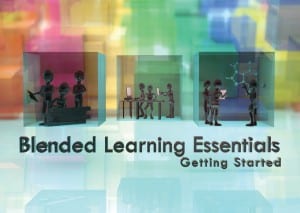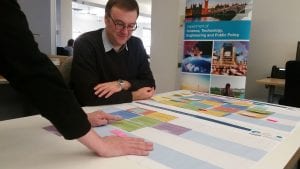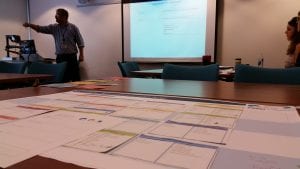
Distance Learning doesn’t need to be lonely.
Image Credit: By loungerie on Flikr
Teaching online requires different approaches to a traditional classroom environment (as does the learning). Teachers who are not prepared or do not know what is involved in the development and implementation of an online course will result in “negative outcomes for students and faculty” (Caullar, 2002). As Open University expert Derek Rowntree (1992) explains, most newcomers to ODL [open and distance learning] need to develop new knowledge, new skills and very often new attitudes and dispositions. Students and staff need to be oriented to the differences in learning online and the change in role and approach for both the teacher and the learner (Palloff and Pratt, 2002). It’s recommended to provide staff development opportunities in online teaching (ibid) and that should come at a later stage, but I think a crucial step precedes it:
How can you teach online if you’ve never experienced learning online?
You must try it. I’d also recommend absorbing what’s around you as well – talk colleagues already active in this space, look for existing resources and participate in relevant networking events. But crucially; join an online course, or ten, and experience it yourself.
Learn online: Take a free course
There is a growing range of free online courses in which you can use to experience being an online learner. The huge selection of free open courses can be searched and filtered by using Mooc aggregators such as Course Talk, Class-Central and Mooc-list. UCL has a partnership with a UK-based Mooc provider FutureLearn and has a growing selection of courses. But you should explore other courses too and you should feel free to sign up for any that interest you – even if you don’t complete them (it’s OK!). Closer to home there’s also a selection of courses on UCLeXtend – UCL’s public-facing e-learning platform – which you can discover from searching the Life Learning course finder and filtering (on the left) to Format > Online and Cost > Free.
Notable courses
Getting started with Moodle (via UCL Moodle) provides an introduction to UCL Moodle and e-learning and provides the basic skills required to set up a course in Moodle.
 Blended Learning Essentials (via FutureLearn) – created in partnership with UCL and University of Leeds, this is a free online course designed to help you understand the benefits of blended learning and how to make more effective use of technology to support your learners.
Blended Learning Essentials (via FutureLearn) – created in partnership with UCL and University of Leeds, this is a free online course designed to help you understand the benefits of blended learning and how to make more effective use of technology to support your learners.
UCL Arena Digital (via UCL Moodle) – three short courses with each lasting two weeks. Each fortnight will end with a live online webinar where you can share your experiences with your colleagues on the course. Topics: multimedia, communication & assessment and feedback.
Teaching online open course (via Brookes.ac.uk) – offered as a free mooc from Oxford Brookes University (and offered as a 10 M-Level credit option, if desired) and is an intensive introduction to supporting student learning in online environments.
 Your mooc mission: try to complete one mooc. Sounds easy? Tell us how you got on in the comments section below.
Your mooc mission: try to complete one mooc. Sounds easy? Tell us how you got on in the comments section below.
Learning from colleagues
Venturing into the world of distance learning is a bit different to that of face to face teaching and you may want to seek guidance from those who have already trodden the ground before you. Within your department you may know colleagues who are running their own distance learning courses, there should be someone within your wider faculty or school. If not, you could look at UCL’s Prospective Student’s course finder for PGT and filter by ‘Distance Learning’ – then try contacting a course team from there. We also run regularly ‘Forum’ events (sign up to the ‘Distance Learning and Life Learning Network’ below).
Join local networks, forums and communities
With representation from all schools the Distance Learning and Life Learning Forum is a community of practitioners from across UCL who are all active in the area of fully online courses and blended learning for taught programmes and CPD/short courses. Or, you may want to form your own departmental, faculty or school-based distance learning groups. These may grow from the ground up, out of teaching committees or via many other ways. Regardless, if you would like UCL Digital Education or CALT to sit on these groups, do get in touch and we can come along too.
For more information we recommend you sign up to the Distance Learning and Life Learning Forum. Note: This can only be done on the UCL network or via remote desktop/VPN.
Connect with support teams
Teams such as Centre for Advancing Learning and Teaching (CALT) and UCL Digital Education have trodden this ground before, and are always happy to hear your ideas, share experiences and help you design, plan, promote, develop and evaluate your distance learning courses. They will listen to your ideas and suggest others to talk to, approaches to take, resources to work through and even courses you can take online to get you started with distance learning.
Get in touch with them from their respective websites – CALT and UCL Digital Education
Next step
So – ready for your mission? If you have any questions you can always contact us, or leave a comment below.
—
Note: this page is an excerpt from the UCL Distance Learning wiki which contains more pages on planning, designing, building and teaching on an online course.
References:
Cuellar, N. (2002). The transition from classroom to online teaching. Nursing Forum,37(3), 5-13. Retrieved from http://search.proquest.com/docview/195001677?accountid=14511
Palloff, R.M., Pratt, K. (2002). Lessons from the Cyberspace Classroom. 17th Annual Conference on Distance Teaching and Learning. Retrieved from http://www.uwex.edu/disted/conference/resource_library/proceedings/01_20.pdf
Rowntree, D. (1992). Exploring Open and Distance Learning. Kogan Page.

 Close
Close








